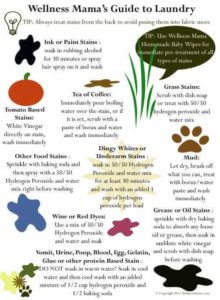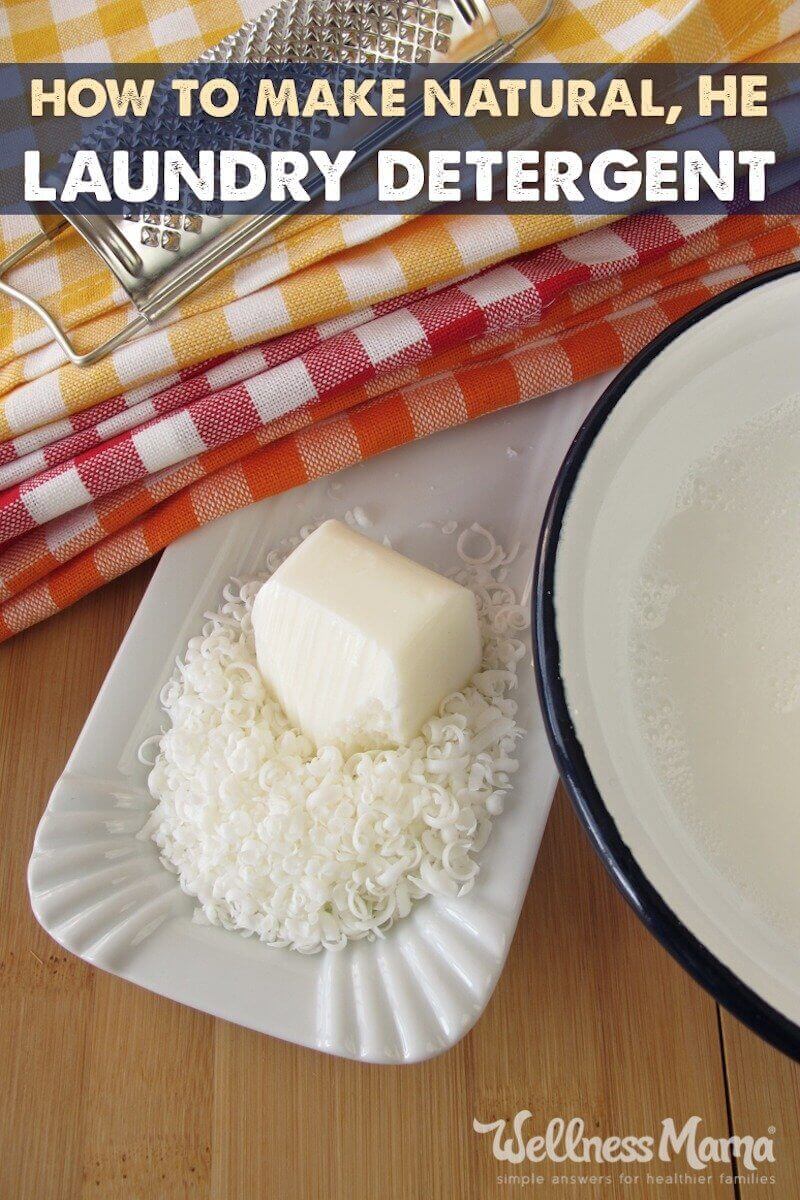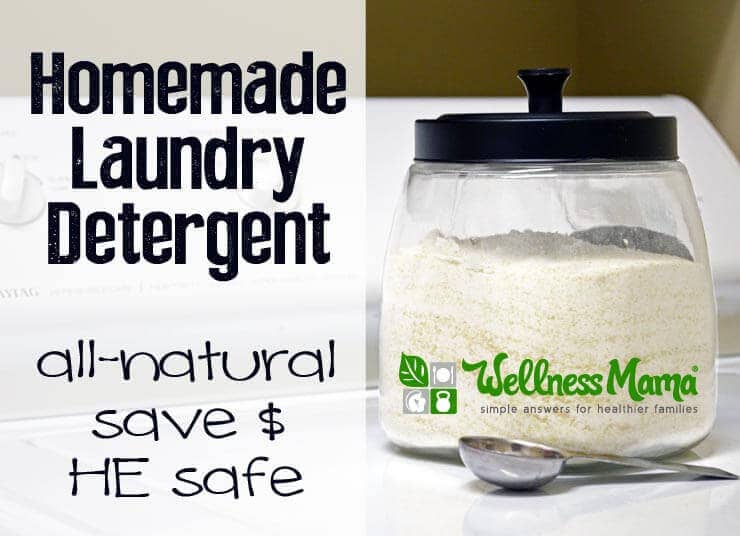Laundry detergent is an easy switch from store bought to homemade. DIY alternatives are often just as effective and much less expensive. I’ve shared my Homemade Laundry Soap but this variation is formulated for high-efficiency washers.
I first considered the idea of homemade laundry detergent when a friend’s mom made hers while I was visiting their house 15 years ago (wow, I just felt old!). Once I started doing my own laundry, I experimented with recipes for laundry soap. This HE version is an updated take on my original creation.
Laundry Detergent vs. Laundry Soap
It is important to note that laundry soap and laundry detergent are not the same thing. A soap is by definition a mixture of fats and oils with an alkali or base, like this recipe for crock pot soap that uses a mixture of olive and coconut oils with a lye and water base.
Detergent, on the other hand, is typically synthetic (at least partially) and is typically designed for a specific purpose, such as to dissolve even in hard water or cold water. Most recipes for “natural” laundry detergents are almost always talking about soaps, and recipes for actual detergents are seldom natural.
Since store bought versions are called “laundry detergents,” I’ve opted to call this tutorial a DIY Laundry Detergent recipe, though it uses a soap base.
Natural Detergent (That Works)
Detergents are designed to work in hot or cold water and to clean inside the fibers of clothes effectively. Depending on water quality, some people find that natural laundry soaps don’t work well on their clothes. Others may notice build up or a dingy color over time.
There is one natural cleaner (not technically a soap) that I’ve found is highly effective and that works as well as high-end commercial detergents. Instead of laundry soap, using 2 Tablespoons of Dr. Bronner’s Sal Suds per load gets clothes really clean without the added fragrances and harmful chemicals.
High Efficiency Safe?
That is the question I’ve gotten the most in the 100+ comments on my original laundry detergent recipe tutorial. I don’t personally have a high efficiency washing machine but have heard from dozens of readers and friends who do and they’ve used this in an HE washer with no problems.
The main concern with a high efficiency washer is creating too much suds, so a low-suds soap or detergent is suggested. This recipe is low-suds by definition and should be safe for HE, but always check with the instructions that came with your machine to make sure before using.
Safe Laundry Detergent Ingredients
Many readers questioned the safety of Borax in my original recipe. After much research, I (still) feel completely comfortable using Borax in laundry soap and other uses that do not come in direct contact with food. Here’s my take on Borax but do your own research and make sure you are comfortable with it (or any ingredient) before using!
Borax-Free Option
A simple borax-free option (that doesn’t require grating) is:
- 2 Tablespoons Sal Suds
- 1/4 cup baking soda OR 2 Tablespoons washing soda (optional)
Just add those at the beginning of the wash cycle. For an extra boost, add 1/4-1/2 cup white vinegar to the rinse cycle. This step is entirely optional but seems to help keep clothes from pilling and looking worn.
Why Natural Laundry Detergent?
I switched to natural homemade laundry detergent/soap to avoid the harsh chemicals, fragrances, colors, and additives in many regular detergents. It turns out that homemade is also much less expensive and incredibly easy to make! I also started making my own linen spray.
Even if you’re just starting out with natural living and wouldn’t dream of making your own deodorant, laundry soap is a simple switch you can make without much effort and without expensive speciality ingredients.
Laundry Detergent Ingredients…
This homemade laundry soap recipe uses three basic ingredients:
- Borax: A naturally occurring mineral- I get mine here.
- Washing Soda: Also called Soda Ash, this helps remove oils and residue. Available at most local grocers or here.
- Grated Bar Soap: Like Dr. Bronners or homemade. I now use this coconut oil laundry soap recipe for our homemade detergent. Many recipes call for Fels Naptha which works well but has some questionable ingredients so we avoid it. I personally think the coconut oil laundry soap works better anyway.
Optional Add-Ins: I’ve also experimented with adding Oxi-Clean or oxygen boosters to this recipe. I’ve found that they don’t do much good when mixed into the recipe, but can be great when added to especially dirty loads of laundry along with the homemade soap.
Another optional addition is essential oils for scent. I prefer lemon or lime essential oils added to the powdered recipe, though most of the scent is gone after drying.
Clean Laundry: Two Ways
This recipe can be made two ways: as a powder or a liquid. The powder is much faster to make and requires much less room to store, but the liquid is more effective for stain treating. The liquid also seems more effective for those with hard water.
I currently use the powdered version and use other natural products for treating stains (see below). Both recipes use the same natural ingredients, so just pick the one that is most convenient for you. This recipe is my powdered version, and the liquid version is in this post.
Laundry Soap Ingredients
- bar of grated bar soap (homemade or natural store bought)
- 1 cup of washing soda
- 1 cup of borax (or additional washing soda)
- 20 drops of lemon or lime essential oils
- optional: 1 cup of oxygen booster (This one lasts us a year.)
How to Make Laundry Soap
- Grate the soap using a hand grater or food processor. Grate into fine particles so it dissolves easily.
- Carefully mix with the washing soda and borax (use gloves or a spoon as these can by drying if used directly on skin)
- Add essential oils and stir.
- Store in an air-tight glass jar.
- Use 1-2 tablespoons per load. Add 1 tablespoon of oxygen booster if needed… I use this on white loads.
Natural Stain Treatment
 Homemade laundry detergent works well, but it won’t work as well as chemically formulated stain-release and cold water formulas from the store. I keep a variety of natural stain treaters in my laundry room and use them depending on the stain.
Homemade laundry detergent works well, but it won’t work as well as chemically formulated stain-release and cold water formulas from the store. I keep a variety of natural stain treaters in my laundry room and use them depending on the stain.
I also keep a small bottle of diluted Sal Suds in my purse for immediate stain treating on the go and it has worked really well. Even on wine. And mustard. Or red clay from the baseball field. And… well, you get the idea.
Bottom Line: Which to Use
Confused by all the options above? Here’s a simple way to figure out which method will work best for you:
Simplest Natural Option
Want the fastest & easiest method with no extra work required? Do this:
- Use 2 Tablespoons Sal Suds (here’s where I get it) per load just like you would a regular laundry detergent
- Add 2 Tablespoons washing soda or 1/4 cup baking soda if you want to for an extra boost (you can actually do this with any laundry soap or detergent)
- If you’re feeling like an over-achiever, add 1/2 cup white vinegar to the rinse cycle.
- Voilà! Clean laundry!
Inexpensive Natural Option
Want to save money and avoid the harmful ingredients lurking in many traditional laundry detergents? Use the Laundry Soap recipe above. Just note that it may not work for all water types and you may need to experiment with soap/washing soda combinations and ratios to find out what works best.
Favorite Pre-made Laundry Detergent Brands (More Expensive but Convenient!)
Homemade may be the least expensive way, but over the years as life has gotten busier, I’ve often bought my laundry soap. Here are some of my favorites:
- My Green Fills Laundry Detergent – Smells fantastic, works well on dirt and stains, and cuts down on plastic waste with concentrated refill packets so you can reuse the same bottle.
- Ecover Zero Laundry Detergent– Works well, relatively cost effective and low/no risk of developmental or reproductive toxicity and cancer according to the EWG.
- Emma Eco Me Detergent – Also rated well by the EWG and cleans up to 64 loads for $12. Good scents.
- Planet Natural Detergent – Relatively eco-friendly and cost effective at $9 for 32 loads.
- Branch Basics – Not only is this a great for laundry, it is also a basic cleaner that you can use around your house. Multiple functions in one!
Obviously, the most frugal option is to make your own, but these natural alternatives are a good choice if you aren’t able to make your own or don’t want to.
Best for Really Hard or Soft Water
If you have really hard or really soft water, the Sal Suds method above may be the best bet.
Do you make your own laundry detergent yet? Will you consider starting now? Share your experience and recipe if you already do!



Leave a Reply